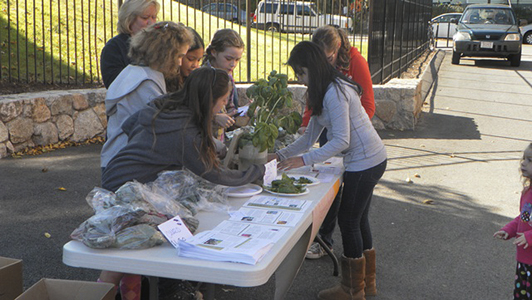
By
After working with Lynch School of Education Associate Professor Mike Barnett to cultivate herbs and vegetables in a new indoor garden, students at St. Columbkille Partnership School in Brighton recently harvested their crops to sell at a school “farmer’s market.”
The market, held Oct. 23, was a sell-out.
Students and teachers set up a table filled with basil, chard, kale and dill for St. Columbkille parishioners and residents looking for fresh food, said Barnett, who has collaborated with schools throughout the city to use indoor gardens to teach science, math and nutrition, along with a little bit of economics and a lot of fun.
“The farmer’s market was an overwhelming success,” Barnett said. “The kids were absolutely fantastic and got everything organized and handled the market perfectly. It was just an outstanding job.”
Proceeds from the sale will fund the next three crops from their classroom garden, where plants grow in a hydroponic system that supplies water, nutrients and light from low-energy grow lamps. The students hope to hold farmer’s markets throughout the fall and winter.
Barnett said the process of starting up the indoor farm requires students to research hydroponics and understand topics in physics, chemistry and plant biology, as well as finance and the economics of operating a farm. This interdisciplinary approach to science education gives students a chance to understand that science is not something that should be limited to a single class. Instead, scientific thinking crosses many subjects and extends well beyond the school walls.
This innovative approach is part of a series of projects Barnett has undertaken to expand options for students to learn more about the so-called STEM disciplines – science, technology, engineering and mathematics – and get them thinking about potential STEM careers.
Barnett’s work is just one example of the support and technical expertise BC and the Lynch School have provided at St. Columbkille, in partnership with the Archdiocese of Boston. His hydroponics project has been supported by Boston College, Loyola Marymount University of California, GYOstuff, STEM Garden Institute, Urban Ecology Institute, BC’s College Bound program and Hydroponics Organics Indoor Gardens, as well as funding from Irving Backman, a Dedham entrepreneur.



